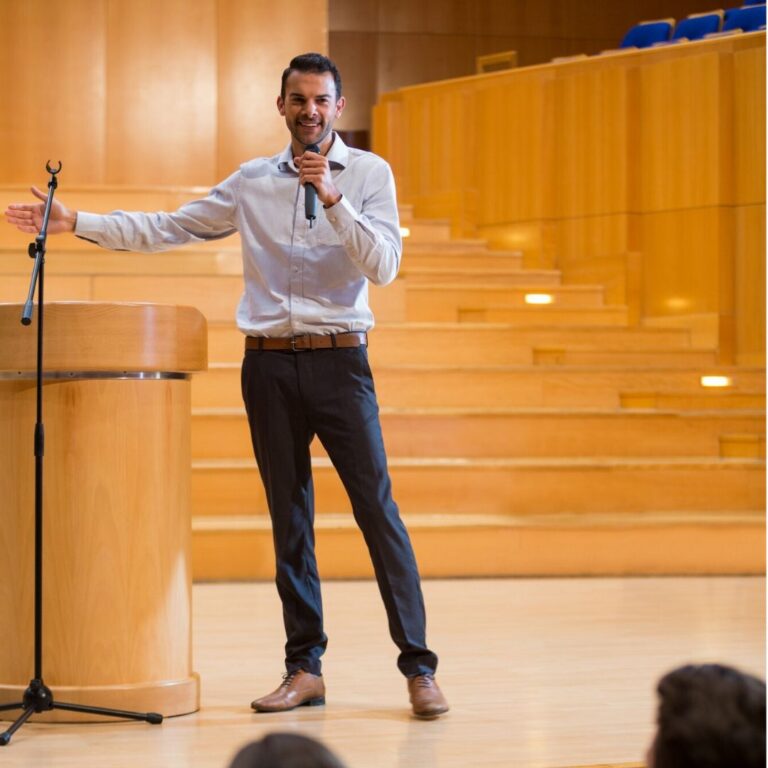
- Home
- Public Speaking Made Easy: Tips for Success
- Shelby Academy
- 0 Comments
- January 7, 2025

Public Speaking Made Easy: Tips for Success
Public speaking can be a daunting experience for many, but it doesn’t have to be. With the right strategies and mindset, anyone can become a confident and effective speaker. Whether you’re addressing a small group or a large audience, mastering the art of public speaking is a skill that can open countless opportunities in both personal and professional life. In this blog, we’ll explore essential tips to help you shine on stage and make your voice heard.
Understanding the Basics of Public Speaking
What is Public Speaking?
Public speaking is the act of delivering a speech or presentation to an audience. It involves sharing ideas, stories, or information in a way that engages and informs listeners. From business meetings to social events, public speaking plays a critical role in effective communication. Understanding its importance is the first step to mastering it.
Common Fears and Misconceptions
Many people fear public speaking due to stage fright, self-doubt, or past negative experiences. However, most of these fears are based on misconceptions. For instance, many assume they need to be perfect, but audiences value authenticity over flawlessness. Recognizing and addressing these fears is essential for growth.
The Benefits of Public Speaking
Public speaking offers numerous benefits, including improved confidence, better communication skills, and the ability to inspire and influence others. It can also enhance career prospects by demonstrating leadership qualities and the ability to articulate ideas effectively.
Preparing for Your Speech
Researching Your Topic
Preparation is key to successful public speaking. Start by thoroughly researching your topic to ensure you’re well-informed and can confidently address any questions. Use credible sources, gather data, and organize your findings into key points.
Structuring Your Speech
A well-structured speech has a clear introduction, body, and conclusion. Begin with a strong opening to capture attention, follow with detailed main points, and end with a memorable conclusion. Using transitions between sections helps maintain flow and keeps the audience engaged.
Practicing Your Delivery
Practice makes perfect. Rehearse your speech multiple times to become familiar with the content and identify areas for improvement. Practice in front of a mirror, record yourself, or present to a trusted friend for feedback. Consistent practice builds confidence and reduces nervousness.
Mastering Delivery Techniques
Using Body Language Effectively
Nonverbal communication plays a significant role in public speaking. Maintain good posture, make eye contact, and use hand gestures to emphasize key points. Avoid fidgeting or crossing your arms, as these can convey nervousness or defensiveness.
Modulating Your Voice
Your voice is a powerful tool in public speaking. Speak clearly and vary your tone, pitch, and pace to keep the audience interested. Pausing at key moments can add emphasis and allow listeners to absorb your message.
Engaging the Audience
Interaction is crucial for keeping your audience engaged. Ask questions, encourage participation, or share relatable anecdotes. A lively and interactive presentation resonates more with listeners than a monotonous lecture.
Overcoming Nervousness
Identifying the Root Cause
Understanding why you feel nervous can help address the issue. Are you worried about forgetting your lines, being judged, or losing the audience’s interest? Pinpointing the cause allows you to focus on specific solutions.
Breathing and Relaxation Techniques
Deep breathing exercises can help calm your nerves before speaking. Practice inhaling slowly, holding your breath for a few seconds, and exhaling slowly. Incorporating relaxation techniques like visualization can also help reduce anxiety.
Embracing Imperfection
No one expects perfection. Mistakes are a natural part of public speaking, and audiences are often more forgiving than you think. Focus on delivering your message authentically rather than striving for perfection.
Enhancing Your Public Speaking Skills
Seeking Feedback
Constructive feedback is invaluable for improvement. After your presentation, ask for feedback from trusted peers or mentors. Take their suggestions seriously and work on areas that need refinement.
Joining Public Speaking Groups
Groups like Toastmasters provide a supportive environment to practice and hone your public speaking skills. Regular participation helps build confidence and offers valuable insights from fellow members.
Staying Updated with Trends
Public speaking evolves with time. Stay updated with trends, such as the use of technology in presentations or emerging communication techniques. Being adaptable ensures your skills remain relevant and effective.
Conclusion
Public speaking is a skill that can be learned and mastered with practice and dedication. By understanding the basics, preparing effectively, mastering delivery techniques, and continuously seeking improvement, you can transform into a confident and impactful speaker. Remember, every great speaker started as a beginner, and with persistence, you too can make public speaking a breeze.
Section Title
Confidence Exercises for English Speaking Speaking English confidently can be a challenge for many...
Tips for Confident English Conversations Speaking English with confidence is essential for effective...
Overcome Fear of Speaking English Enhance your English communication skills to impress clients and...
Impress Clients with English Communication Enhance your English communication skills to impress...
Ace Job Interviews with Business English Boost your confidence and excel in job interviews with...
Negotiate Successfully in Business English Master the art of negotiation in Business English! Learn...
Network Effectively with Business English Learn to network effectively using Business English!...
Polish English for Presentations Delivering a presentation in English requires clarity, confidence...
Key Business English Phrases for Professionals Effective communication in the business world...










